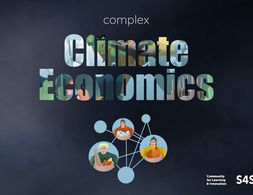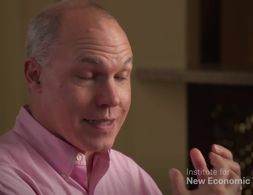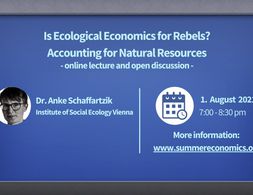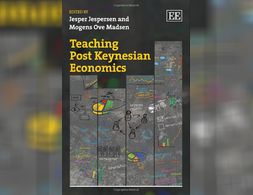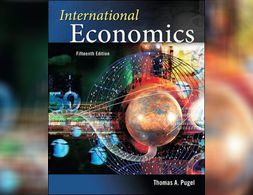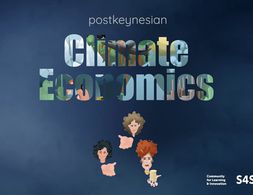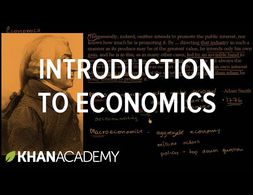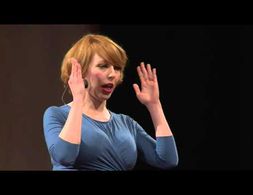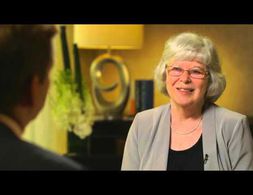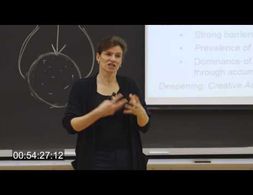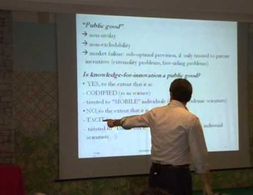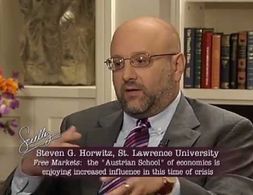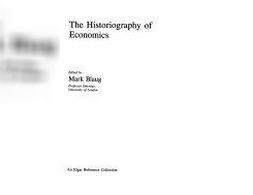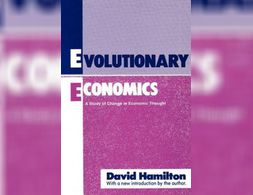✕
694 results
Can pluralism in economics be useful to tackle the fight against climate change? How can diversity in methods and ideas allow for a better understanding of the issue of the climate crisis? What solutions do different schools of thought offer to overcome the most pressing challenge of the 21st Century? Our Rethinker Henrika Meyer will give you some answers and give you a glimpse of the solutions pluralism offers to tackle the fight against climate change.
Professor Joseph Aldy from Harvard Kennedy School gives us some insights about how economics can set the balance between policymakers, scientists, employers and citizens.
Ecologcial economics conceptualizes our society as embedded within the environment and our economic system as embedded within society and the environment.
Sporting events can be seen as controlled, real-world, miniature laboratory environments, approaching the idea of “holding other things equal” when exploring the implications of decisions, incentives, and constraints in a competitive setting (Goff and Tollison 1990, Torgler 2009). Thus, a growing number of studies have used sports data to study decision-making questions that have guided behavioral economics literature.
This book argues that mainstream economics, with its present methodological approach, is limited in its ability to analyze and develop adequate public policy to deal with environmental problems and sustainable development. Each chapter provides major insights into many of todays environmental problems such as global warming and sustainable growth.
This book contends that post Keynesian economics has its own methodological and didactic basis, and its realistic analysis is much-needed in the current economic and financial crisis.
The book is offered, in the first instance, to students who are beginners in economics, but some parts of it may be of wider interest.
The three topics, Economic Doctrines, Analysis and Modern Problems, might be the subject of concurrent courses or they may be studied consecutively.
International Economics, 15e continues to combine rigorous economic analysis with attention to the issues of economic policy that are alive and important today in this field.
Economics is extremely sick. It is so locked in its past that nearly all of its introductory textbooks are modelled on one that appeared in 1948. The discipline cannot continue in its autistic state much longer.
Economics for Emancipation (E4E) is a seven-module introductory curriculum with interactive and participatory workshops. It offers a deep critical dive into the current political economic system, exploration of alternative economic systems, and dynamic tools to dream and build the economy that centers care, relationship, and liberation.
Critique of neoclassical economics is presented and contrasted with the more realistic assumptions made by an complex adaptive systems and evolutionary approach.
This video provides a brief introduction to post-keynesian economics and how the school of thought would tackle climate change.
This short video by the Khan Academy presents a classic introduction to economic teaching. Starting with the quote by Adam Smith in "The Wealth of Nations" on the invisible hand, it shows how economics deals with the question of the allocation of scarce resources and shortly presents different questions addressed by microeconomics and macroeconomics. It further makes reference to questions of simplification in mathematical models.
How do we get our dinner? And who cooked Adam Smith's dinner? Starting with Smith's answer on the origin of a dinner, Katrine Marçal problematizes and illustrates how unpaid labour was and is still being ignored by economic theory and how the homo economics represents characteristics perceived as male.
Sheila Dow discusses the concept of radical uncertainty and the failure of neoclassical economics to integrate it into its analysis. As to the implications for financial regulation that arise from the presence of radical uncertainty she argues for institutional overhaul, where the banks see themselves as a licensed partner of the central bank and where rules, values, and conventions would be subject to a cultural shift. Also, Sheila Dow advocates for a renewed focus on retail banking.
In the interview, Robert Skidelsky discusses the emergence of political influence of a certain school of economic thought and how the success of an economic theory depends on the power relations in the society. He introduces the historical example of Keynesian economics and its replacement by liberal economic theory and policy in the aftermath of the Great Depression, and transfers this historical case to the dominant paradigm of austerity policies in the Europe as response to rising public debts caused by the Financial Crisis. He contrasts austerity policies with a Keynesian approach. Furthermore, he relates the targets of policy to the underlying power structures, for example when not the reduction of unemployment but the protection of financial capital is politically addressed.
What is innovation, what drives innovation and the process that differentiates firms? What is competition and what kind of dynamics lie behind the differences between firms and their innovative activities? Mariana Mazzucato elaborates on those questions from an evolutionary economics' and Schumpeterian perspective. The slides of her lecture are not visible, hence some visualizations can't be followed.
The Lecturer Prof. Francesco Lissoni presents basic concepts of the Economics of Innovation. Firstly, he distinguishes between invention, innovation and diffusion and relates innovation to economic growth. Subsequently, he elucidates learning and network effects.
Steve Horwitz, professor of economics at St. Lawrence University, gives a concise account of Austrian approach and talks about how it relates to the various current public policy issues.
In this interview, the political activist, author and lecturer Dr. Vandana Shiva explains the linkage between ecology, feminism and economics along the lines of current effects and implications of the Corona-Crisis in India and around the world.
This blogpost discusses the bias the Economics discipline has towards Africa. It points out how important conferences on issues regarding Africa take place in Western countries at the expense of those based in Africa.
This self-paced free course by Perry Merhling guides you to his "Money View" approach that integrates the fields of economics and finance. The course can easily be understood by people interested people without technical economic knowledge or training as it is primarily a tool for analysis.
This volume focuses on the importance of the history of economic thought as an intellectual discipline. It counters the arguments of some contemporary economists who describe it as studying the mistakes of the past. However, all the great economists - Smith, Ricardo, Marx, Marshall, Keynes and even Milton Friedman - have drawn on the history of economics to find an appropriate pedigree for their own theoretical innovations.
The economics of worker cooperatives is a branch of economic inquiry with a long and esteemed pedigree, dating at least from the work of John Stuart Mill in the mid-nineteenth century.
In reviewing this book in The Economic Journal, S.G. Checkland said that it should be read as a vigorous attempt to relate economics to general thinking and as a challenge to those who are practitioners or elaborators of narrowly prescribed techniques.
This Micro-Masters program on Circular Economy looks at the concept and its application from different angles, covering a very wide variety of topics (From Fossil Fuels to Biomass: A Chemistry Perspective; Circular Economy: An Interdisciplinary Approach; Economics and Policies in a Biobased Economy).
It offers a well-rounded, multidisciplinary perspective, using sciences and humanities together for a deeper understanding of the topic. A great start for newbies with Circular Economy!
The access to the course is for free, but you can also apply for full-time on-campus graduate-level programs, be it Wageninged or other universities.
Alvin Roth and Lloyd Shapely won the Nobel Memorial Prize in Economic Sciences for their work on market design back in 2012, but it is a field that is still underrepresented in economics education. All markets have rules, and how these rules are set influence how the market functions.
A Heterodox Approach to Economic Analysis This important new book introduces students to the fundamental ideas of heterodox economics presented in a clear and accessible way by top heterodox scholars It offers not only a critique of the dominant approach to economics but also a positive and constructive alternative Students …
‘We cannot afford their peace & We cannot bear their wars’:
Value, Exploitation, Profitability Crises & ‘Rectification’
This chapter discusses the role of gender in economic relations, processes, and outcomes. Gender differences in economic outcomes such as labor force participation and wages have received growing attention from economists in the last several decades – a positive and much needed development in economic thinking.
Pluralism includes mainstream economics. Our campaign for pluralism, including this series, have generally focused on ideas outside the mainstream on the basis that it gets plenty of attention already so we want to spend our time exposing people to alternatives. Nevertheless, mainstream ideas deserve some attention. On top of this, a curious feature of modern economics education is that some of the best ideas from mainstream economics are not even taught to undergraduates! During this series I will explore such ideas, starting today with the market construction technique known as ‘matching’.
In the pluralist showcase series by Rethinking Economics, Cahal Moran explores non-mainstream ideas in economics and how they are useful for explaining, understanding and predicting things in economics.
We use cookies on our website. Click on Accept to help us to make Exploring Economics constantly better!

